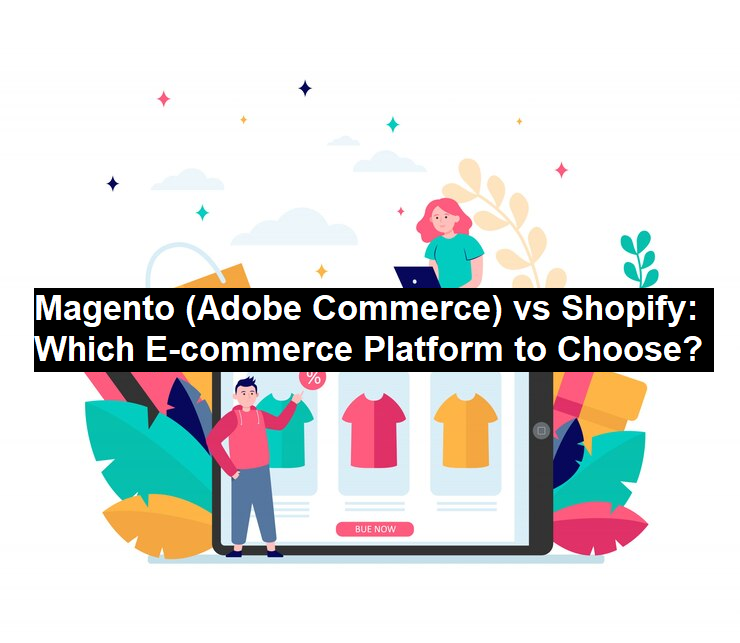
Magento (Adobe Commerce) vs Shopify: Which E-commerce Platform to Choose?
Selecting the most appropriate e-commerce platform is a key factor for success. Analyzing Magento (Adobe Commerce) And Shopify since they are among the most preferred platforms each with different abilities, and pricing models. In this article, we’ll outline the main pros and cons of Magento (Adobe Commerce) vs Shopify, pointing you in the direction you should go for your business.
Overview of Magento (Adobe Commerce)
Magento, rebranded as Adobe Commerce, is highly extensible, flexible ecommerce solution that offers impressively high levels of customization. It offers additional options that help merchants make even more unique and individualistic Internet stores to fit the required business niche. Adobe Commerce is perfect for mid to large businesses where companies need total control over their online store.
Read: Empowering Communities: Investing in Local Solar Jobs
Key Features of Magento (Adobe Commerce)
- Customizable Design and Layouts:
Magento (Adobe Commerce) come with a rich design customization features that allow business owners to give their stores a unique brand look. Designers are able to edit the theme, arrangement and the appearance in order to obtain users preferences. This flexibility makes it possible for the businesses to make their online service to be unique to the customers.
- Advanced SEO Tools:
Magneto has excellent SEO features that enable the merchants to take full control of, the basic SEO factors such as Meta tags, Urls and sitemaps. These features facilitate enhancing organization’s Web site for granting better visibility on Search engine and generating more organic traffic. In particular, comprehensive SEO capabilities of Magento contribute to the improvement of the site’s rank and attraction of potential consumers.
- Inventory and Order Management:
Magento offers great ways of updating product catalog, keeping track of stock and order-processing capabilities. Such characteristics bring efficiency to inventory tasks, which enables the businesses to keep track of their stocks and efficiently manage order flows. It also has advanced reporting ability that assists merchants in their ability to manage their stock and supply according to the demand of customers.
- Multi-Store Support:
With the Magento multistore solution, companies can easily operate more than one website or different brand, provided by the worktop. Every store might have their own catalogue, price lists, and customers to target, according to the differentiated market. The first and perhaps the most obvious is that with the increasing globalization and diversification of companies and brands, this concentration of management is preferred.
- Scalability and Flexibility:
Magento is built for large number of visitor and large number of products that means it is highly scalable as businesses expand. The platform can be extended to fulfill a certain requirement and that is why businesses can incorporate a certain feature or an integration into the platform. This scalability makes sure that Magento is capable of coping with the future growth without the problem of slowness.
- B2B Functionality:
Magento has modules developed specifically for B2B sales with options that would allow for extra features such as bulk purchase, variations in prices depending on the quantities to be purchased and specialized product buying guides. They enable organizations to handle big orders and present special prices when purchasing from a specific customer in the B2B purchasing mode. It also has a variety of account management features, which can be used to foster the required type of relationships with the B2B consumers.
Pros and Cons of Magento (Adobe Commerce)
Pros
- Highly Customizable: Supports extensive customization for store layouts, features, and integrations.
- Open-Source: Offers greater control and flexibility compared to closed-source platforms.
- Scalability: Suitable for large businesses handling extensive inventory and traffic.
- Strong Community Support: A large community of developers and experts provides resources and solutions.
Cons
- Complex Setup and Maintenance: Requires technical knowledge and may involve high development costs.
- Hosting Costs: Unlike hosted platforms, Magento requires separate hosting, which adds to expenses.
- Resource-Intensive: Demands more server resources, which can impact performance if not optimized.
Overview of Shopify
Shopify is an all-in-one cloud solutions for building an ecommerce store that is user friendly and fast to set up. It works with a broad scope of companies from startups to big brands, it provides customers with a simple dashboard and an extensive list of integrated tools. Shopify is preferred most by SMBs that look for fast and easy platform to build their stores.
Key Features of Shopify
- User-Friendly Interface
Shopify is easy to use and upon creating an account one can start an online store without a lot of fuss. Ambitious Design has merge convenience of work with digital marketing and landscaped the platform by drag’n drop system so the merchant can work it by their own without programming knowledge where they can create page, add products they want and manage their stock. This expediency also helps to avoid occupying business owners with the site’s management instead of development.
- Mobile Optimization
All Shopify themes are mobile-friendly to guarantee that online shops are pleasing to the eye and easy to use on any gadget. There is also an optimized last stage in the form of check-out since the number of customers buying through the Mobile is increasing. Mobile optimization is important as it reaches customers who are always on the move, increases the possibility of sales among the target clients.
- Built-In SEO Tools
Shopify provides simple SEO features including options to edit meta tags, titles, use URLs to enhance the businesses’ website exposure to search engines. It also creates sitemaps on its own, it helps search engines to crawl and index site content much easier. These include the built-in tools that enable shopify to help the store owners to optimize there website in order to attract natural traffic.
- App Integrations
Shopify offers an app store which offers add-ons for almost any sort of feature, including email marketing to inventory management. These apps enable merchants to introduce additional features to the store without the need of coding a lot. Such an ecosystem has made it possible for the applications to be personalized and the stores modified according to the needs of doing business.
- 24/7 Support
Shopify offers their customers first-grade customer service support, which is available 24/7 through the online chat, email, or phone in case merchants experienced some problems that need to be solved. To help sustain businesses, the support team helps answer technical questions, billing concerns, and store setup. Having people on board as and when it is needed also helps to provide sellers with an additional layer of comfort that back up is always available.
- Payment Processing
Shopify Payments is the payment solution provided by Shopify that allows you to check out at lower costs, using no third party processers. Shopify Payments allows customers to complete their purchases directly on the site – thus, the funnel of the buying process is not interrupted. Such an efficient payment instrument increases confidence and utility in payments for both sellers and buyers.
Pros and Cons of Shopify
Pros
- Ease of Use: Quick to set up, making it ideal for beginners and small businesses.
- Comprehensive Hosting: Managed hosting and maintenance included, reducing technical complexity.
- Extensive App Ecosystem: A broad range of plugins available to extend store functionality.
- Reliability and Security: High levels of uptime and integrated security features.
Cons
- Limited Customization: Less flexible compared to open-source platforms like Magento.
- Monthly Fees: Recurring subscription fees that can increase with advanced features or larger plans.
- Transaction Fees: Additional transaction fees if not using Shopify Payments.
Comparing Magento (Adobe Commerce) and Shopify
Cost and Pricing
- Magento (Adobe Commerce): Provides Magento Open Source for free, while the most equipped Adobe Commerce can be expensive, including the licensing and the hosting fees. This demand can also lead to the growth of expenditures as a result of the necessity to involve developers.
- Shopify: Offers simple package structures that have hosting and maintenance included in the cost. Packages are starting from the Basic, then Advanced; however, there is an extra cost for the plugins and themes.
Ease of Use
- Magento: It can need specialized technological knowledge in order to install, work with the existing configuration, and maintain therefore is not that amicable towards users not experienced with it.
- Shopify: Popular because of its ease of use, featuring a clear dashboard and basic processes which can be dragged and dropped into place making its use easier for those who are not very computer literate.
Customization and Flexibility
- Magento: Has extreme flexibility in that it may be adapted to suit the specifics of various business requirements.
- Shopify: Has few configuration features relative to Magento but with app marketplace you get extra modules that expand capabilities of platform.
Themes and Design Options
- Magento: Has a set of created themes but building a separate image may be possible only with the help of developers.
- Shopify: Offers a large number of professional templates for different occupations, search by license, free and paid, easy to edit even by people with no web design skills.
SEO and Marketing Tools
- Magento: Magento’s SEO is very powerful having multiple options for SEO meta tags, URLs, and Rich Snippets again. It is developed to look more suitable for the businesses that the SEO service they will address will require versatility to cover the entire scope.
- Shopify: Shopify, while providing a number of basic SEO tools, pales when it comes to customization in more complex SEO options. Shopify basic email and marketing tools are easy to use and effective for SMB’s due to their integration.
Third-Party Integrations and Plugins
- Magento: Magento operates a vast number of extensions and supports strong third-party apps integration with ERP, CRM, etc, suitable for multiple business systems.
- Shopify: The app store of Shopify offers several solutions that may be easily installed with the website. While Shopify has quite a number of apps, it may not offer the same level of business-fit connectivity that comes with Magento.
Performance and Scalability
- Magento: Magento is easily customizable, it can handle large number of products and many concurrent visitors. Adobe Commerce (cloud version) is fast but requires the best server hosting for the open-source version.
- Shopify: Site speed and performance is handled by Shopify and while it is a peace of cake for majority of standard and large stores, it might not be so effective for extremely large stores that are enterprise grade stores with special requirements.
Security
- Magento: Magento is endowed with more security features as they include the host security features as well as have updated frequently. That being said, users of the open-source version are required to provide their own security measures on their end.
- Shopify: Most security features are handled by Shopify, ensuring that all store fronts are PCI compliant equipped with SSL certification.
Support and Resources
- Magento: Community edition of Magento has a community support but paid users of Adobe Commerce get support. Like any good CMS application, Magento also possesses a trove of documents and developers’ facilities.
- Shopify: It also offers user support services by offering customer support through telephone, online web chat, and email 24/7, as well as providing users with a strong knowledge base so that the can addresses problems on their own if they wish to.
Magento (Adobe Commerce) vs Shopify: Which is Right for Your Business?
The choice between Magento (Adobe Commerce) and Shopify largely depends on your business’s unique needs:
- Magento (Adobe Commerce): Ideal for organisations with big technical capabilities, or which require complex integration, high levels of customization and flexibility in the usage of the system.
- Shopify: Suitable for business with extensive brainstorming needs or up to 250 people or as an easy to use everything in one package product with little technical configuration.
Conclusion
Magento, or Adobe Commerce, and Shopify are two powerful e-commerce platforms designed to solve different business tasks. Magento offers the necessary level of flexibility and maximum extend, whereas Shopify is easy to use and has all the necessary functions for the smaller businesses or for those who don’t have professional web developers. While looking for Shopify development you should always analyze your business size, investment, and expertise level, and future growth expectations to choose the best mechanism to grow your online store.


